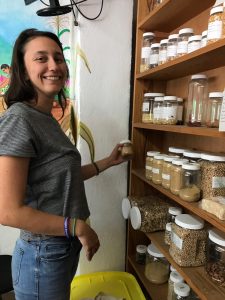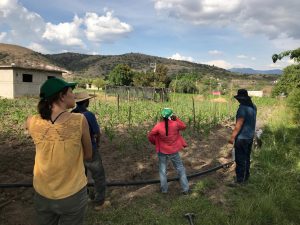Projects for Peace
Overview
This project was incredibly influential in how I view the world and the role everyone plays in realizing everyone’s human rights. In helping bring this project to fruition, it fortified my want to work towards a more equitable future, where anyone can lead a healthy life.
– Eduardo Fernandez, 2018 Projects for Peace Recipient
Every year, 100 or more student leaders are each awarded a grant in the amount of $10,000 to implement a “Project for Peace,” typically over summer break. Most grantees are undergraduates. The program encourages young adults to develop innovative, community-centered, and scalable responses to the world’s most pressing issues. Along the way, these student leaders increase their knowledge, improve skills, and begin to see themselves as agents of change.
Projects for Peace partners with more than one hundred colleges, universities, and other educational institutions each year, including UNC-Chapel Hill. The selection process at UNC-Chapel Hill is managed by the Carolina Center for Public Service.
 The program is made possible by the late Kathryn Wasserman Davis, an accomplished internationalist and philanthropist, who celebrated her 100th birthday in 2007 by committing $1 million for 100 projects for peace. She was so pleased with the outcome that she has continued funding these projects. For more information, visit the Projects for Peace website.
The program is made possible by the late Kathryn Wasserman Davis, an accomplished internationalist and philanthropist, who celebrated her 100th birthday in 2007 by committing $1 million for 100 projects for peace. She was so pleased with the outcome that she has continued funding these projects. For more information, visit the Projects for Peace website.
What do you mean by peace?
Applications for a Projects for Peace grant will need to be able to clearly articulate what they understand peace to be and how the project may contribute to peace. Prospective applicants might wish to review and reference resources such as the Strategic Peacebuilding Pathways from the Kroc Institute for International Peace Studies, resources offered by the Institute for Economics and Peace or publications from the United Stated Institute for Peace.
Middlebury College has developed a series of videos to help guide students through the process of applying for a Projects for Peace grant. View Project Cycle Conversations: Part 1 – Initiating a Project for Peace and Project Cycle Conversations: Part 2 – Planning a Project for Peace as you consider your proposal.
Submission Guidelines
Each participating institution will select and submit one proposal for funding along with up to two additional proposals to be considered. The Carolina Center for Public Service oversees the selection process at UNC-Chapel Hill.
To be considered, an undergraduate student (or group of students) must prepare an online application that:
- describes the project (who, what, where) and how it will promote peace,
- includes expected outcomes,
- includes a realistic budget and
- describes prospects for future impact.
 Applications for the 2025 Projects for Peace will be accepted from November 2024 through mid-January 2025. Apply online through the CCPS Application and Nomination Portal.
Applications for the 2025 Projects for Peace will be accepted from November 2024 through mid-January 2025. Apply online through the CCPS Application and Nomination Portal.
All successful Projects for Peace grant recipients whose projects involve international travel must seek approvals and abide by current university policy on international travel.
Please note that communication between students writing proposals for this award and the Projects for Peace office at Middlebury College is prohibited. Please direct any questions about this award to the Carolina Center for Public Service at ccps@unc.edu.
2023 Award Recipients
Grace May, a junior majoring in Global Studies, and Divya Patel, a received a 2023 Projects for Peace grant for their project, Afghan Women’s Group: Using Craft for Social and Emotional Healing for Displaced Women. The Afghan Women’s Group will provide social and emotional support for refugee women who are survivors of war-related trauma and cultural displacement, using culturally significant crafts to facilitate social gathering and emotional healing. This collaboration will be housed within a trusted community-based organization, the Refugee Community Partnership, who has the infrastructure and staff to provide culturally and linguistically appropriate support, and with whom the project team members have a longstanding relationship.
